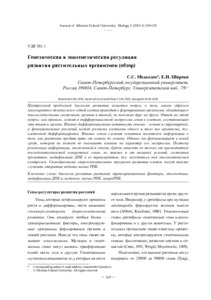Показать сокращенную информацию
Генетическая и эпигенетическая регуляция развития растительных организмов (обзор)
| Автор | Медведев, С.С. | ru |
| Автор | Medvedev, Sergey S. | en |
| Автор | Шарова, Е.И. | ru |
| Автор | Sharova, Elena I. | en |
| Дата внесения | 2010-12-28T04:03:46Z | |
| Дата, когда ресурс стал доступен | 2010-12-28T04:03:46Z | |
| Дата публикации | 2010-06 | en |
| URI (для ссылок/цитирований) | https://elib.sfu-kras.ru/handle/2311/2141 | |
| Аннотация | Центральной проблемой биологии развития является вопрос о том, каким образом многократное деление всего одной клетки приводит к формированию организма, обладающего многоклеточными системами органов и тканей, не похожих друг на друга. Ответ на этот вопрос, как правило, лежит в дифференциальной экспрессии генов в клетках, составляющих эти ткани и органы. Именно дифференциальная активность генома - основа и структурных, и функциональных различий между разными клетками одного и того же организма, т.е. клеточной дифференцировки. Именно геном служит основным носителем информации о том, как растению пройти путь от семени до семени. Однако ген функционирует в некой среде, которая не может не оказывать влияние на характер его экспрессии. Поэтому реализация информации, заключенной в геноме, будет зависеть не только от нуклеотидных последовательностей конкретных генов, но также и от внешних условий, состояния хроматина, модификаций ДНК и ее транскриптов, т.е. находиться под эпигенетическим контролем. Своеобразными «переключателями» программ развития клеток могут также служить открытые недавно малые РНК. | ru |
| Аннотация | The completion of the Arabidopsis thaliana genome sequencing in 2000 was the key event in plant biology. Over the past 10 years, genomes of another three plant species (rice, alfalfa and poplar) were almost completely sequenced. The sequencing of maize, wheat, barley, vine and tomato genomes is in progress. It is arising a new science - genomics, that investigates nucleotide composition of genome, principles of individual genes and their complexes functioning, as well as genome evolution. Biology turns into so called post-genomic period of its history, in which predominant researches start with genome and protein sequencing and complete with determination of individual genes and proteins functions, and their evolutionary origin too. On the other hand, genes activity depends not only on the transcription factors specific to the given genes but also on the whole complex of factors able to directly or indirectly influence chromatin structure. For this reason, realization of information enclosed in genome depends not only on nucleotide sequence of given genes but also on environment, chromatin state, modifications of DNA and its transcripts, i.e. it is under epigenetic control. Epigenetic state of plant organisms is determined by levels and patterns of DNA methylation, post-translational modifications of histones, the presence of histone variants and chromatin compaction. Recently discovered noncoding microRNAs, playing key role in genes silencing by cleavage of genes transcripts or by repression of mRNA translation, may serve as a kind of «switches» for cell developmental programs. It is becoming evident that small RNAs perform a wealth of key functions in eukaryotic organisms, and therefore it is now impossible to use the simple scheme «DNA-RNA-protein» for description of genome work. In the article, it is discussed the role that transcription factors, small RNAs, modifications of DNA and chromatin play in the regulation of plant growth and development. | en |
| Язык | ru | en |
| Издатель | Сибирский федеральный университет. Siberian Federal University. | en |
| Является частью серии | 2010 3 ( 2 ) | en |
| Является частью серии | Журнал Сибирского федерального университета. Биология. Journal of Siberian Federal University. Biology. | en |
| Тема | биология развития растений | ru |
| Тема | транскрипционные факторы | ru |
| Тема | эпигенетика | ru |
| Тема | модификация ДНК и гистонов | ru |
| Тема | малые РНК | ru |
| Тема | микроРНК | ru |
| Тема | plant development | en |
| Тема | transcription factors | en |
| Тема | epigenetics | en |
| Тема | DNA and histone modifications | en |
| Тема | small RNA | en |
| Тема | microRNA | en |
| Название | Генетическая и эпигенетическая регуляция развития растительных организмов (обзор) | ru |
| Альтернативное название | Genetic and Epigenetic Regulation of Plant Development | en |
| Тип | Journal Article | |
| Тип | Published Journal Article | |
| Контакты автора | Медведев, С.С. : Санкт-Петербургский государственный университет , Россия 199034, Санкт-Петербург, Университетская наб., 7/9 , e-mail: ssmedvedev@mail.ru | ru |
| Контакты автора | Medvedev, Sergey S. : Saint-Petersburg State University , 7-9 Universitetskaya nab., St. Petersburg, 199034 Russia , e-mail: ssmedvedev@mail.ru | en |
| Контакты автора | Шарова, Е.И. : Санкт-Петербургский государственный университет , Россия 199034, Санкт-Петербург, Университетская наб., 7/9 | ru |
| Контакты автора | Sharova, Elena I. : Saint-Petersburg State University , 7-9 Universitetskaya nab., St. Petersburg, 199034 Russia | en |
| Страницы | 109-129 | en |

